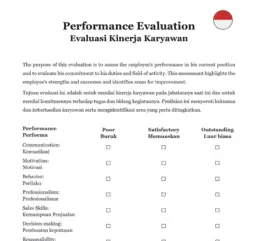Ready to use legal template
Work on without any hassle
Indonesian-English translation
Ready to use legal template
Work on without any hassle
Indonesian-English translation
Learn more about Employee Performance Evaluation in Indonesia
The employee performance evaluation is a useful tool for employers in Indonesia, as it allows them to assess the performance of their employees, identify areas for improvement and determine opportunities for growth and development. This document verifies that the tasks and responsibilities written in the Employment Contract are met and can be used to determine employee compensation and promotions. Download our employee performance evaluation template to ensure that your company has competent and productive employees. The employer can then write an Employment Warning Letter to address disciplinary issues or even use our Employment Termination Letter for dismissal.
Table of contents
What are the key components of an employee performance evaluation in Indonesia?
How does the evaluation affect compensation and promotions?
What challenges when conducting employee performance evaluation?
How does the evaluation improve performance and productivity?
How can technology be used to streamline the evaluation process?
What are the legal considerations for conducting evaluations in Indonesia?
How to conduct an evaluation in a culturally diverse workplace?
What are the key components of an employee performance evaluation in Indonesia?
In Indonesia, the key components of an employee performance evaluation often encompass a review of the employee’s job performance, productivity, and attendance. Additionally, evaluations typically assess the employee’s skills, competencies, and potential for future growth within the company. Communication abilities and teamwork are evaluated, along with adherence to the organization’s policies and procedures. A self-assessment by the employee is usually part of the process, providing a personal perspective on their performance. The manager’s assessment is also integral to the evaluation. Some Indonesian companies may incorporate 360-degree feedback, collecting insights from an employee’s colleagues and supervisors. The frequency of these evaluations can be annual, semi-annual, or quarterly, aligning with the company’s specific policies.
How does the evaluation affect compensation and promotions?
An employee performance evaluation can be used to determine compensation and promotions by providing a comprehensive assessment of an employee’s job performance, productivity, and abilities. Employers can use the information gathered during the evaluation process to determine if an employee is meeting or exceeding expectations and if they are ready for a promotion or deserve a raise. For example, if an employee demonstrates strong leadership skills, a strong work ethic, and a willingness to take on additional responsibilities, they may be considered for a promotion. Additionally, if an employee consistently meets or exceeds their performance goals, they may be eligible for a raise or bonus.
ℹ️ By linking an employee’s performance to their compensation, employers can ensure that they are rewarding their top performers and motivating employees to improve their performance. Employers may choose to write an Employment Warning Letter to keep the employee informed of poor performance.
What challenges when conducting employee performance evaluation?
There are several common challenges faced by employers when conducting employee performance evaluations. One of the biggest challenges is ensuring that the evaluation process is fair and unbiased. Employers may struggle to accurately assess an employee’s performance if they are not familiar with their work or if they have personal biases towards the employee. Another challenge is ensuring that the evaluation process is objective. Employers may have trouble separating an employee’s personal traits from their job performance, which can lead to inaccurate evaluations. Communication is also a common challenge, particularly for employees who speak different languages or have different cultural backgrounds. Employers may have difficulty communicating effectively with employees, which can lead to misunderstandings and dissatisfaction with the evaluation process.
How does the evaluation improve performance and productivity?
An employee performance evaluation can be used to improve performance and productivity in a number of ways. One way is by providing a clear and objective assessment of employee performance. This can help managers identify areas where employees need improvement and provide targeted feedback and training to help them improve.
Additionally, by linking employee performance to rewards such as promotions and raises, employers can motivate employees to improve their performance. Employers can also use the data collected from employee evaluations to make data-driven decisions that can improve performance and productivity in the organization. By regularly conducting employee performance evaluations, employers can stay informed about employee performance over time and make adjustments as necessary to improve performance and productivity.
Furthermore, by incorporating employee input into the performance evaluation process, employers can ensure that evaluations align with employee’s own perception of their performance and that evaluations are based on accurate information. Overall, an employee performance evaluation is a powerful tool for identifying and addressing performance issues and for promoting a culture of continuous improvement within the organization.
How can technology be used to streamline the evaluation process?
In Indonesia, technology can enhance the employee performance evaluation process by automating tasks and providing real-time insights. Here’s how:
1. Online forms: Facilitate self-assessment and managerial feedback through user-friendly online forms.
2. Automated reminders: Keep evaluations on track with scheduled reminders for both employees and managers.
3. Data analysis tools: Utilize software for in-depth analysis of performance metrics to inform decision-making.
4. Cloud-based software: Enable access to performance evaluations anytime, anywhere, via cloud services.
5. Automated report generation: Streamline report creation and distribution with automation.
6. Mobile apps: Allow for remote evaluations through dedicated mobile applications.
7. Automated feedback: Offer continuous, automated feedback to employees, aiding in their development and performance improvement.
What are the legal considerations for conducting evaluations in Indonesia?
In Indonesia, legal considerations for employee performance evaluations include ensuring a fair and unbiased process in line with the Manpower Law, providing clear and objective criteria based on job performance, and respecting non-discrimination laws. Employers must incorporate employee self-assessment, maintain confidentiality, and handle personal data according to data protection laws. Regular and timely evaluations are necessary, and the process must comply with labor laws and any collective labor agreements. These measures help prevent disputes and ensure a transparent and legally compliant evaluation system.
How to conduct an evaluation in a culturally diverse workplace?
When conducting employee performance evaluations in a culturally diverse workplace, it is important to take into account the cultural backgrounds of the employees being evaluated. Some best practices include:
| ➤ Fairness and objectivity: Ensure that the evaluation process is fair and objective, and that it does not discriminate against employees on the basis of race, religion, gender, age, or other protected characteristics. |
| ➤ Clear and objective criteria: Provide clear and objective criteria for evaluating employee performance, and base the evaluation on these criteria rather than personal biases. |
| ➤ Self-evaluation: Provide employees with an opportunity to provide their own assessment of their performance and to take their feedback into consideration. |
| ➤ Confidentiality: Ensure that the evaluations are conducted in a confidential manner, and that the evaluations are not shared with unauthorised individuals or organizations. |
| ➤ Translation or interpretation: Consider hiring a translator or language interpreter, or training managers to communicate in different languages to ensure effective communication. |
| ➤ Cultural sensitivity training: Provide cultural sensitivity training to managers and employees to help them understand and appreciate different cultural backgrounds and values. |
| ➤ Employee input: Incorporate employee input into the performance evaluation process to ensure that evaluations are fair and objective and based on accurate information. |
| ➤ Regular evaluations: Conduct evaluations regularly, this will help to ensure that evaluations are conducted in a timely manner and that the feedback provided is up-to-date. |




